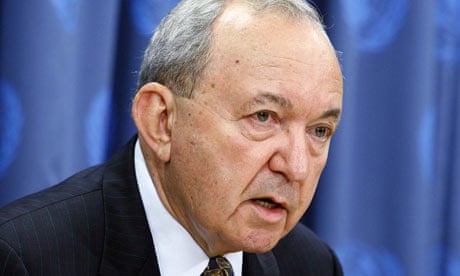The UN today put off action on a report criticising Israel's actions during the war in Gaza after Palestinian leaders suddenly dropped their support for a resolution, apparently under heavy US pressure.
The decision marked a surprising reversal in the Palestinian position which, until now, had backed the findings of the report by the South African judge Richard Goldstone.
Goldstone accused both Israel and the Palestinian Islamist group Hamas of war crimes during the three-week conflict.
He was particularly critical of Israel, both for its conduct of the war and its continued occupation of Palestinian territory.
The UN human rights council in Geneva had been due to vote today on whether to pass the Goldstone report to the UN security council for further action.
That vote will now be delayed until the council meets next, in March next year.
Israel had strongly rejected the findings of the Goldstone report as biased, even though it also criticised the actions of Hamas.
The US administration said it had "very serious concerns" about Goldstone's recommendations, which included a call for the UN security council to investigate and raised the possibility of investigation by the international criminal court and judges from individual countries.
The Palestinians do not have a seat on the 47-member human rights council, but Arab and Muslim countries with council seats had been expected to push for the report to be endorsed.
The Palestinian reversal came after "intense diplomacy" by Washington, which told the Palestinians that going ahead with the vote would harm efforts to restart peace talks with the Israelis, according to diplomats quoted by news agencies.
"The Palestinians recognised that this was not the best time to go forward with this," the official said.
Some western countries, including the US, were also thought to be concerned about the precedent that would be set by such international investigations into wartime actions.
However, Imad Zuhairi, the deputy Palestinian ambassador in Geneva, said the report "remains alive" and would be debated next spring. The delay "is not a victory for Israel", he added.
It is understood that the Palestinians had helped draft a motion endorsing the Goldstone report and its recommendations, but that it became clear that the US, Japan and those European countries on the human rights council would not support the motion.
It was then decided to postpone the motion rather than have it voted down or vetoed.
Ghassan Khatib, the head of the Palestinian Authority's media centre, said the Palestinians still supported the Goldstone report.
"There is no change in the Palestinian position," he added. "Palestinian officials didn't backtrack from the position they declared, which is that they expect the human rights council to adopt the report and that the UN should do whatever it takes to ensure the implementation of its recommendations."
It appeared that the Palestinian leadership was reluctant to lose the chance to return to peace negotiations with Israel and unwilling to try other steps to put pressure on Israel such as international legal action.
Robert Blecher, an analyst with the International Crisis Group, said a similar decision had been taken last week when the Palestinians agreed to meet the Israelis in New York despite Israel's decision not to accept their call for a full halt to settlement construction.
"This is a further indication that the current Palestinian leadership is not considering any options except for negotiation and in that sense the climbdown, like the climbdown in the meeting in New York city, is not unexpected – just the speed with which it was taken," he said.
Israel refused to co-operate with Goldstone's investigations, not even granting him entry to the country.
It then launched an intense diplomatic and public relations operation against his report, particularly after efforts this week in Britain to have an arrest warrant issued against Ehud Barak, the Israeli defence minister who oversaw the Gaza war.
Yesterday, Binyamin Netanyahu, the Israeli prime minister, said an endorsement of the Goldstone report would "strike a fatal blow against the peace process" and deny Israel's "right to self-defence".
Goldstone defended his work against Netanyahu's criticism, saying: "I think he got wrong what our report is all about.
"He talked about Israel's right to self-defence. That is not what the report was about."
He said both sides in the conflict had violated international law by targeting civilians.
Earlier in the week, he had told the human rights council that he wanted a "transparent, open investigation" by both sides into the allegations made in his report.
The 575-page report found that some Israelis should face "individual criminal responsibility" and that both sides had committed war crimes and possible crimes against humanity.
The three-week war, which left 1,387 Palestinians dead, according to the Israeli human rights group B'Tselem, and killed 13 Israelis, triggered criticism across the world.
